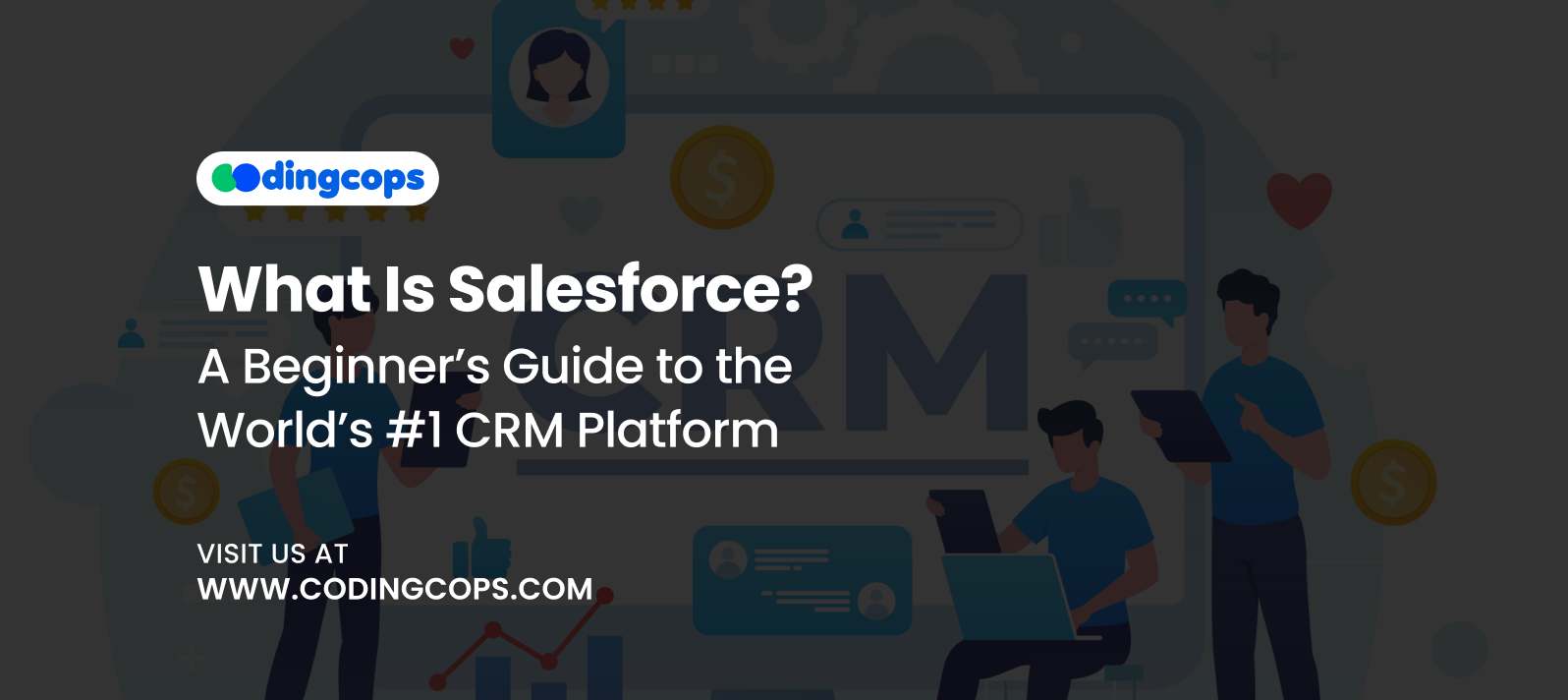According to a report, around 29.2% of Salesforce clients are from the professional services industry. This is due to the fact that Salesforce has come to represent CRM excellence. Salesforce is used by businesses of all sizes, from start ups to multinational corporations, to effectively manage sales funnels and offer customer support.
As the world’s best CRM platform, it offers businesses an all in one ecosystem for growth and customer success.
Therefore, we will explain what Salesforce is and why businesses of all sizes use it in this guide.
Salesforce
Salesforce is a cloud based CRM program that lets businesses manage customer interactions and sales processes from one central location.
Fundamentally, Salesforce helps businesses to:
- Track and manage customer data.
- Automate repetitive business processes.
- Improve teamwork.
- Use analytics to get insights that can be put to use.
Additionally, consumers may access their data at any time via a web browser or a mobile app, thanks to Salesforce’s dependable cloud. Salesforce’s adaptability has made it more desirable at a time when remote and hybrid work settings are commonplace.
Moreover, over the years, Salesforce has grown beyond being just a CRM system. It has evolved into a complete ecosystem encompassing sales and app development. Additionally, many organizations worldwide rely on Salesforce to enable their digital transformation.
Why Salesforce is The Most Preferred CRM Platform?
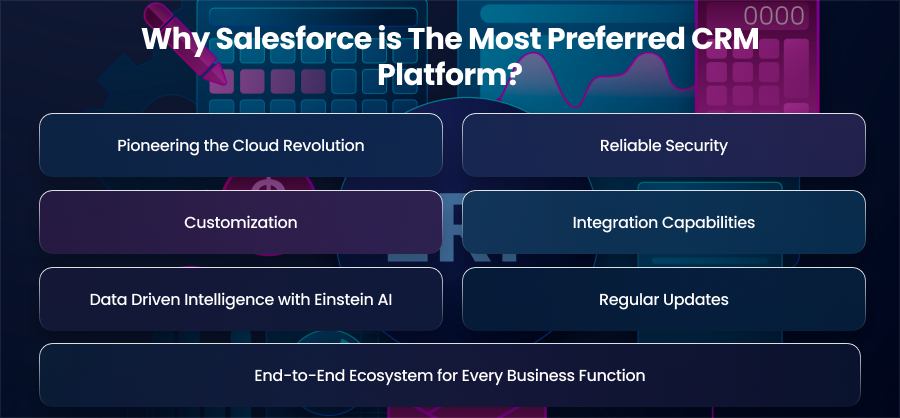
Pioneering the Cloud Revolution
The majority of commercial software needed intricate on premise installations and specialized IT teams to handle upgrades when Salesforce first launched in 1999. Salesforce changed this model by introducing Customer Relationship Management through the cloud.
This SaaS approach eliminated the need for physical infrastructure and made enterprise grade CRM accessible to businesses of all sizes. Instead of worrying about maintenance or hardware costs, companies could simply log in from a browser and manage all customer operations seamlessly.
Salesforce’s cloud first vision not only disrupted traditional CRM vendors but also paved the way for today’s digital transformation era. Moreover, its success proved that cloud computing wasn’t just the future; it was the present.
End-to-End Ecosystem for Every Business Function
What truly sets Salesforce apart from other CRMs is its comprehensive ecosystem. Instead of being a single tool for sales management, Salesforce offers an integrated suite of cloud products that cover every customer facing function:
- Sales Cloud
- Service Cloud
- Marketing Cloud
- Commerce Cloud
- Analytics Cloud
These components all function flawlessly together, guaranteeing seamless data transfer across teams. Few rivals can match the comprehensive perspective of customers that this cohesive environment enables businesses to create.
Customization
Salesforce understands that every business operates differently. Businesses may design dashboards and data models that are exactly what they need because of the platform’s unmatched customisation options.
Through tools like Salesforce Lightning Platform, businesses can build custom applications without deep coding expertise. Developers can also use Apex and Visualforce to create advanced and enterprise grade solutions.
Integration Capabilities
In a world where businesses rely on multiple tools and systems, integration is essential. With its seamless integration with thousands of third party apps via Salesforce AppExchange, Salesforce excels in this area.
Salesforce facilitates seamless data transfer between systems, including accounting programs like QuickBooks, ERP programs like SAP, and teamwork platforms like Microsoft Teams and Slack. By doing this, companies may function from a single source of truth and get rid of data silos.
Data Driven Intelligence with Einstein AI
One of Salesforce’s most groundbreaking innovations is Einstein AI. The platform has an AI engine integrated right into it. Einstein helps businesses use data to make better and faster choices.
To improve business performance, it provides advanced forecasting and predictive insights.
For instance, Einstein can help sales teams identify which leads are most likely to convert and enable customer support teams to anticipate client needs before they arise.
Regular Updates
Salesforce’s commitment to continuous improvement sets it distinct from its competitors. Every year, the company provides three major improvements.
This guarantees that clients will constantly take advantage of the newest developments without incurring extra upgrading fees or experiencing technical difficulties. Salesforce’s forward thinking approach has led to features like:
- Data Cloud for unifying massive volumes of real time data.
- Einstein Copilot for conversational AI assistance.
- Net Zero Cloud to help companies track and reduce their carbon footprint.
Reliable Security
Salesforce has gained trust by putting security and compliance first at a time when data breaches and privacy issues are in the news. The platform employs multi factor authentication to protect sensitive data.
It complies with international standards, ensuring businesses meet global regulatory requirements. Salesforce’s trust site provides real time transparency into system performance and security metrics.
Features of Salesforce
Sales Cloud
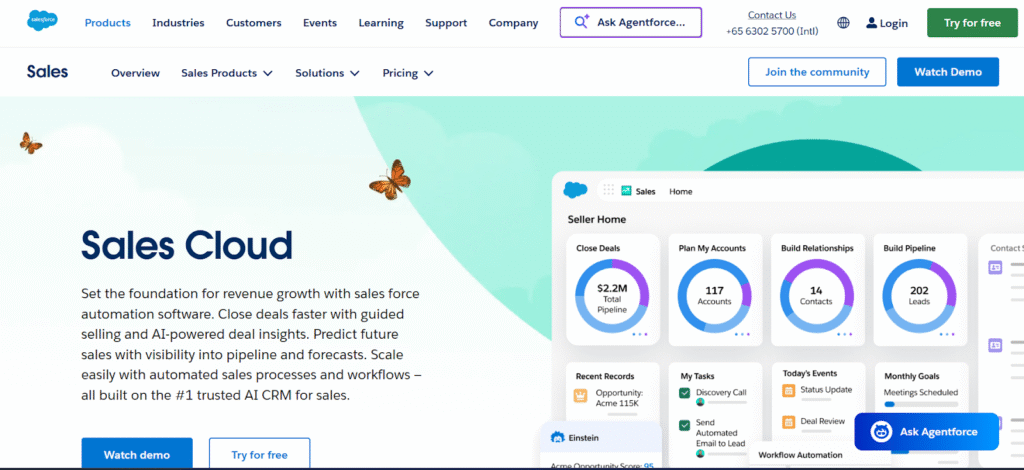
Sales Cloud, one of Salesforce’s primary products, is intended to improve the whole sales process. Additionally, it assists sales teams in managing leads. Salespeople may concentrate on developing connections instead of managing tedious administrative duties by utilizing automation. By offering forecasting capabilities, the Sales Cloud guarantees that teams always have the necessary information.
Service Cloud
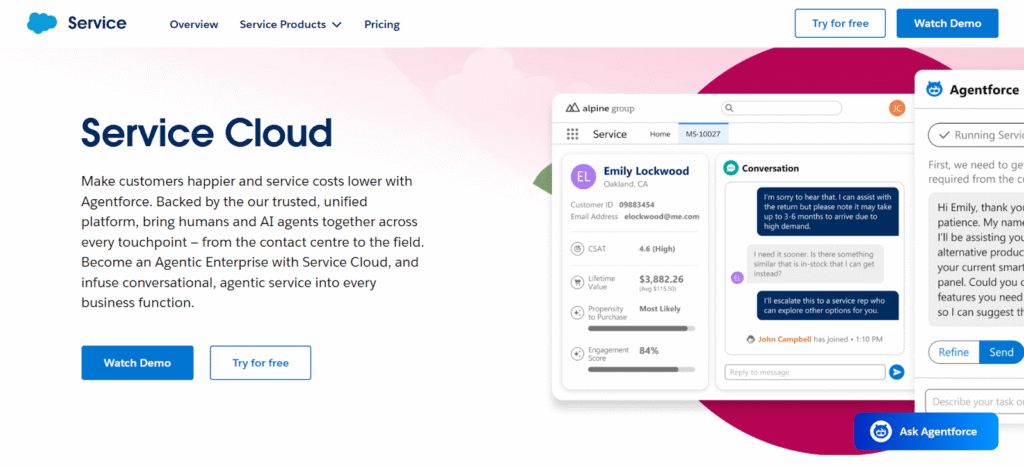
Service Cloud focuses on customer service and support operations. It allows businesses to deliver exceptional service experiences through multiple channels. Case management systems may be used to effectively log and handle customer complaints. Higher customer satisfaction ratings and quicker reaction times are guaranteed when AI chatbots and automation are used. In order to lessen the stress on support workers and preserve a flawless customer experience, Service Cloud also offers self service portals where clients may look up answers on their own.
Marketing Cloud
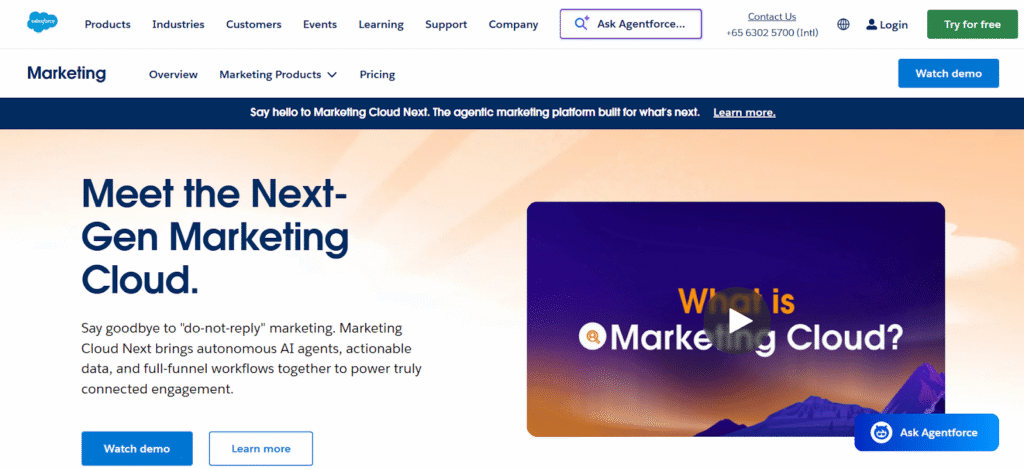
Through data driven and customized campaigns, Marketing Cloud assists companies in establishing connections with their target consumers. It also enables email marketing automation and consumer segmentation based on data. The program can provide timely notifications and assess client behavior. Businesses may thus create more intelligent marketing that engage their target audience by using AI data. Additionally, Marketing Cloud changes how businesses interact with clients at every step of the purchasing process.
Commerce Cloud
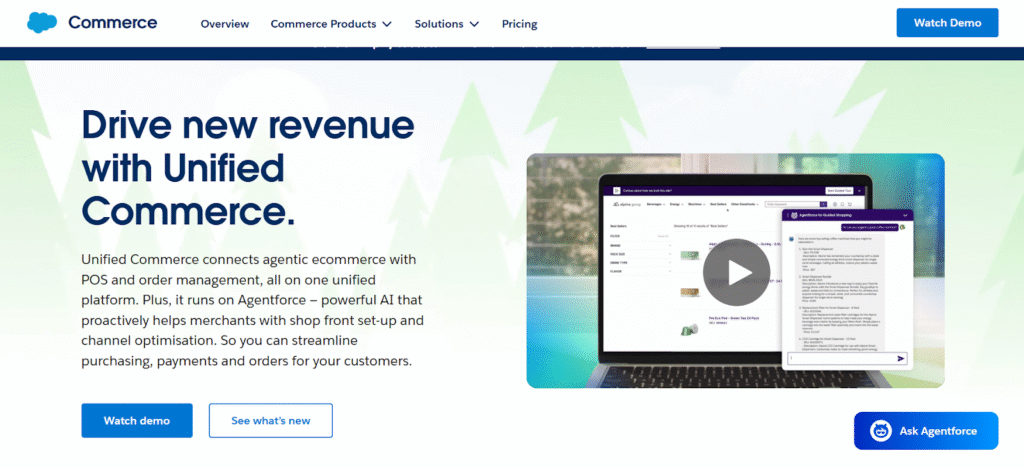
Businesses that operate in both B2B and B2C contexts are the target audience for Commerce Cloud. Additionally, it offers a single platform for establishing a smooth cross channel buying experience. Customers receive personalized product recommendations and higher engagement rates because to AI customization.
Inventory tracking and order management are made easier with Commerce Cloud. This helps retailers deliver a consistent brand experience. It’s particularly valuable in an era where omnichannel commerce has become essential for success.
Analytics Cloud
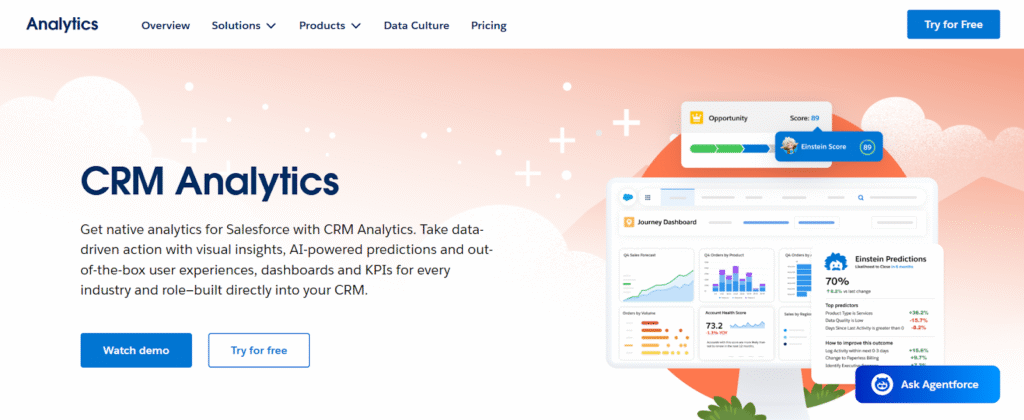
Businesses can turn data into actionable insights using Salesforce’s Analytics Cloud. It also provides predictive analytics and intuitive dashboards that help teams make quick, well informed decisions. With a few clicks, users may examine metrics and performance trends without depending on spreadsheets. Leaders are therefore empowered to spot development prospects and streamline procedures using this data driven approach.
AppExchange
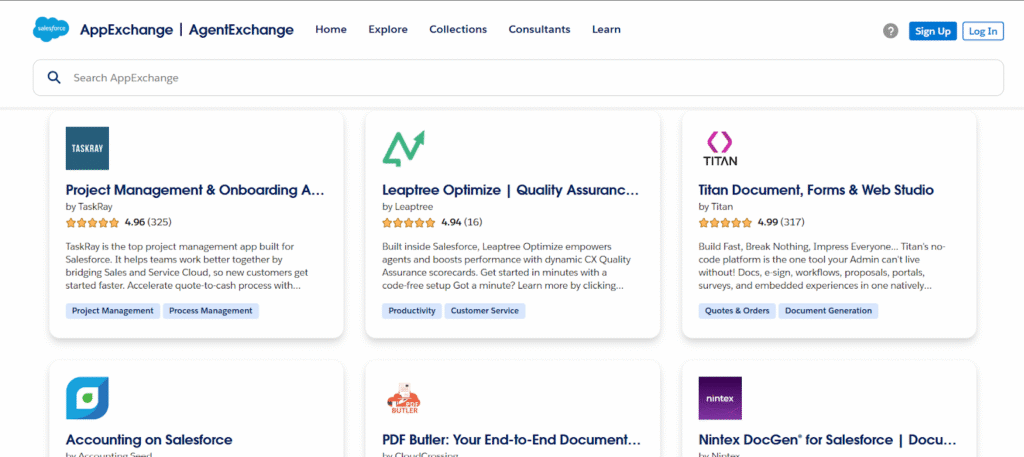
AppExchange is Salesforce’s marketplace for third-party integrations and apps. It also enables businesses to enhance Salesforce’s capabilities with special tools without needing complex programming. Project management apps are among the many business tools available on AppExchange that seamlessly integrate with the Salesforce ecosystem. Businesses can increase features as they grow and modify Salesforce to suit their own requirements because to this flexibility.
Einstein AI
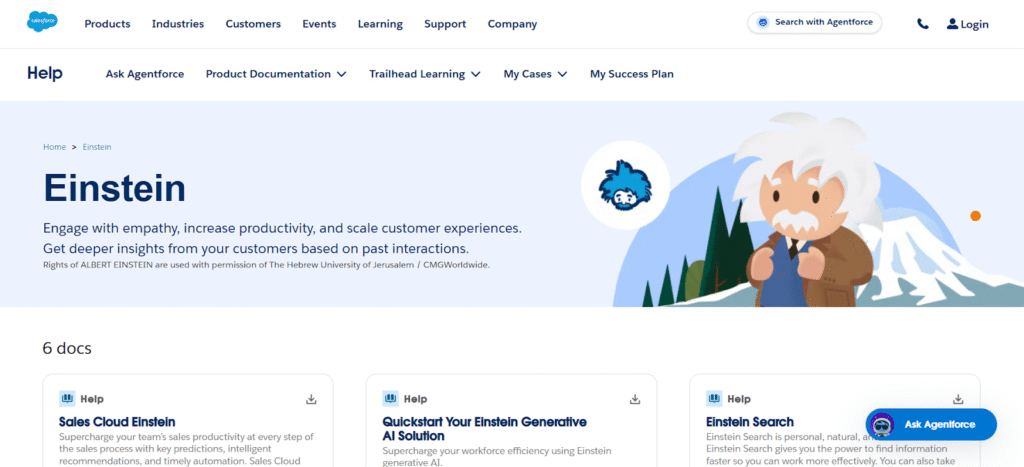
Einstein AI is Salesforce’s built in AI layer that brings predictive capabilities and automation to every part of the CRM. Additionally, it forecasts trends and customizes interactions with customers by analyzing past data. For instance, Einstein can make product recommendations based on consumer preferences or forecast which leads are most likely to convert. Salesforce facilitates effective decision making for enterprises by directly integrating AI into workflows.
Benefits of Using Salesforce for Businesses
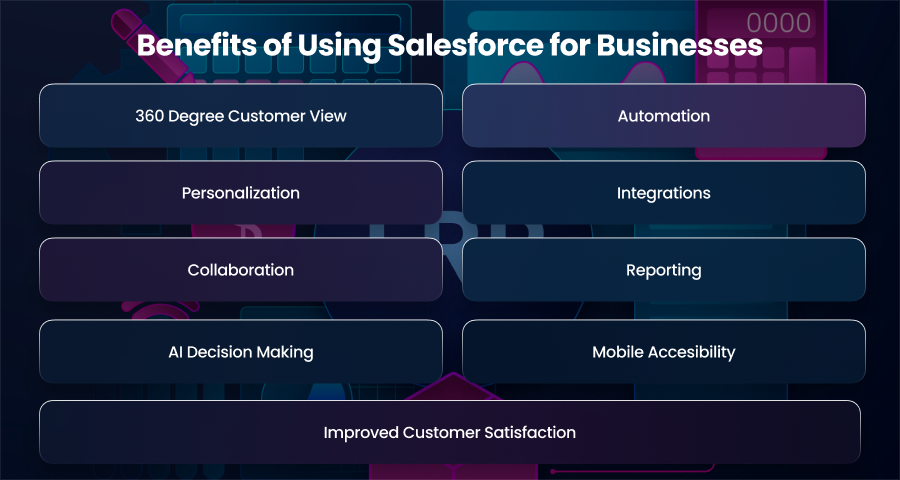
360 Degree Customer View
One of Salesforce’s most defining advantages is its ability to provide a holistic view of every customer. Additionally, the software creates a single dashboard by combining data from several touchpoints. Businesses may better comprehend the journey and behavioral patterns of each consumer with the aid of this unified picture. Sales representatives can personalize their pitches and services teams can resolve issues more efficiently.
Automation
Salesforce is excellent at automating monotonous chores that frequently cause teams to lag. The technology decreases human error and does away with manual data entry with AI automation and workflow rules. Additionally, sales teams may assign leads automatically, and marketing teams can create campaigns without constant supervision. Because of this, this level of automation not only increases productivity but also saves a lot of time. This allows teams to focus on strategic growth.
Personalization
Salesforce is aware that each company is different. The platform provides a wide range of customization choices to meet the unique objectives of a business and the demands of the industry. Custom dashboards and reports can be created by enterprises using tools like Salesforce Lightening App Builder, frequently without the need for sophisticated coding.
Integrations
Companies use a range of platforms and technologies, such as project management software and email marketing. Additionally, using AppExchange or APIs to interact with third party apps is made simple by Salesforce’s dependable integration features. This implies that companies may synchronize data between other platforms and Salesforce. By removing data silos, these linkages provide a single environment in which information is shared easily throughout teams.
Collaboration
Collaboration is the foundation of successful organizations. Moreover, Salesforce provides the means to facilitate it. Features like Slack Integration allow teams to communicate and share information without switching between applications. Everyone will be in agreement with customer demands if various teams coordinate more effectively. Improved productivity and quicker decision making are the results of increased collaboration.
Reporting
Salesforce provides the insights that are need to support decisions. Its Analytics Cloud offers robust dashboards and reporting capabilities that convert unprocessed data into insight that can be put to use. Companies may use interactive graphics to estimate future results and track key performance indicators. Real time analytics can assist in locating bottlenecks and highlighting expansion prospects.
AI Decision Making
Salesforce’s Einstein AI takes analytics a step further by infusing AI into everyday business operations. Moreover, it predicts customer behavior and scores leads based on conversion potential. Einstein, for example, may notify sales teams when an opportunity is threatened or suggest items to clients. Businesses are able to anticipate client demands thanks to predictive intelligence.
Improved Customer Satisfaction
Any CRM’s ultimate purpose is to ensure customer satisfaction, and Salesforce excels at this. Businesses are able to promptly reply to inquiries because of its extensive customer management features. Additionally, businesses are able to provide constant assistance through a variety of channels. No client request is left unanswered because of features like automatic follow ups and AI chatbots.
Mobile Accessibility
Salesforce’s mobile application is a significant advantage in the time of remote work. It also enables teams to communicate and access customer information from any place. Whether a manager authorizes a request while traveling or a salesperson updates an opportunity after a client meeting, the Salesforce mobile experience makes sure that everything goes without a hitch.
Final Words
Salesforce offers a multitude of advantages compared to a traditional CRM. It also combines automation and data to create a powerful platform that supports growth at all levels. Salesforce users benefit from greater consumer insights.

